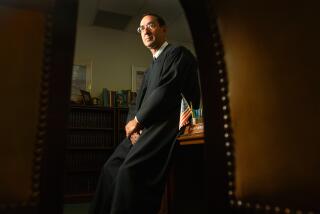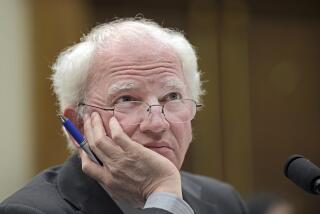Appeals court justice should be ousted for sexual misconduct, judicial watchdog says
- Share via
A state judicial watchdog group decided Tuesday that Court of Appeal Justice Jeffrey Johnson should be removed from the bench for sexual misconduct, dishonesty and undignified conduct.
Johnson was charged with sexual misconduct toward 17 women at the courts where he worked and at professional functions, including unwanted touching, disparaging remarks and multiple instances of undignified conduct while he was under the influence of alcohol.
“Treating women disrespectfully, including unwanted touching and making inappropriate sexual comments, reflects a sense of entitlement completely at odds with the canons of judicial ethics and the role of any judge,” the California Commission on Judicial Performance said. “Sexual misconduct has no place in the judiciary and is an affront to the dignity of the judicial office.”
Among those Johnson was found to have sexually harassed was Justice Victoria Chaney, who serves with him on the Los Angeles-based 2nd District Court of Appeal. Former Gov. Arnold Schwarzenegger appointed both Johnson and Chaney to the appeals court. Chaney told the commission that Johnson harassed her from 2009 to 2018.
The commission found that Johnson squeezed one of Chaney’s breasts in a courthouse hallway, repeatedly touched her breasts while hugging her, occasionally patted her buttocks and commented on her nipples.
Chaney testified during the commission’s investigation that she had not initially reported Johnson or told him to stop harassing her because she feared it would creative divisiveness on the court. She also believed she was the only woman being harassed and felt she was tough enough to handle it, she said.
Until the “Me Too” movement, she testified, she believed women who complained were not believed and might be marginalized. She also said she had conflicting feelings about Johnson. Once she learned that other women had complained about him and that she would be part of a broader workplace investigation, she decided to come forward, she said.
Johnson’s “pattern of conduct” undermined the public’s trust in the judiciary, the commission found.
“We find particularly concerning Justice Johnson’s actions toward women who had recently graduated from law school; were in the early stages of their legal careers; and welcomed the opportunity to establish professional contacts with a Court of Appeal justice,” the commission wrote.
It said the most serious misconduct occurred when Johnson was intoxicated, “impairing both his judgment and his recollection of events.”
The commission has brought formal proceedings against only two other appellate justices since 1960. San Francisco-based Court of Appeal Justice J. Anthony Kline was charged with failing to follow a precedent. The charge was later dismissed.
The late California Supreme Court Justice Marshall F. McComb was forced to retire in 1977 at the age of 82 after he was found to have “senile dementia.”
Johnson denied the most serious charges but admitted he did not have appropriate boundaries.
The commission concluded that Johnson maligned his accusers and testified untruthfully during hearings on the charges.
“Justice Johnson’s refusal to admit to serious misconduct, and his intoxication, coupled with his failure to be truthful during the proceedings, compels us to conclude that he cannot meet the fundamental expectations of his position as a judge,” the commission said.
The commission’s decision becomes final in 30 days, though Johnson has the right to ask the California Supreme Court to review it.
Paul S. Meyer, Johnson’s attorney, said he will ask the state Supreme Court to review the “unprecedented” decision to remove a sitting justice who has no past record of discipline and was not found to have committed “willful misconduct.”
“The remedy chosen deprives the public of a diverse jurist who is universally acknowledged to be brilliant and exceptionally fair,” Meyer said.
Meyer said no witness complained that Johnson’s handling of cases was unfair.
“The entire matter here involved nonjudicial social conversations,” Meyer said.
More to Read
Sign up for Essential California
The most important California stories and recommendations in your inbox every morning.
You may occasionally receive promotional content from the Los Angeles Times.











